5 Fictional Towns/Countries Representing Real-Life Japanese Cultures in Anime

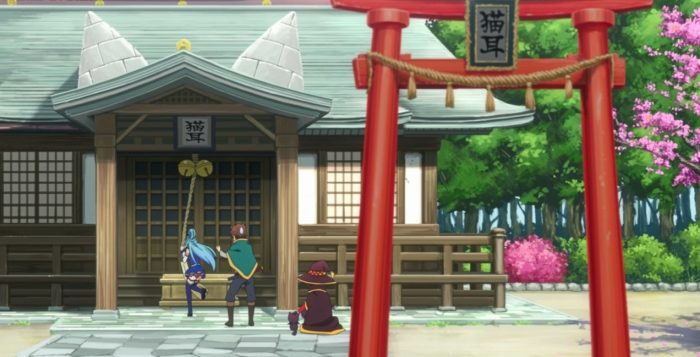
Fantasy is one of the most popular genres in anime, especially when it is paired with action and adventure. From Berserk to Sword Art Online, there is a wide spectrum of fantasy anime that you can find out there, all with their own distinct style of visual and storytelling. One thing that most of them have in common, however, is the fact that most of them take place in western-style settings. That is especially true for any fantasy anime that feature the world of magic, swords, monsters, and the like. Nevertheless, there are some anime that purposely insert a nice little town/country that is clearly based on real-life Japanese cultures, filled with iconic things like onsen, ramen, kimono, and samurai, just to name a few. So with that in mind, here are a couple of fictional towns/countries that represent real-life Japanese cultures in fantasy anime.
5. Crimson Demon Village from Kono Subarashii Sekai ni Shukufuku wo! (KonoSuba: God’s Blessing on This Wonderful World!)
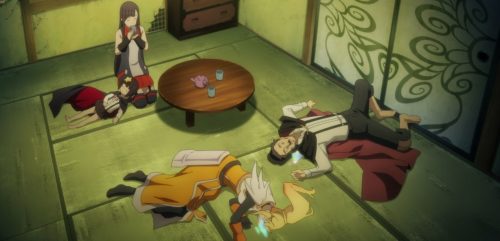
Crimson Demon Village is a little village where the people of the Crimson Demon race live, and it is also Megumin and Yunyun’s hometown. Since it is located near the Demon King’s territory, it is officially one of the most dangerous places in the world. However, since everybody in Crimson Demon Village can cast advanced magic spells, they can easily overpower any incoming demon king’s army. The Crimson Demon Village looks like a mixture of Japanese and Western-style settlements. You can find modest houses made out of stones like the ones that you can see in big cities like Axel. On the other hand, you can also find traditional wooden Japanese houses here. These kinds of houses are also fully equipped with conventional tools and features that you’d see in real-life traditional Japanese houses, such as Tatami mats, Chabudai (short-legged floor table), and also futon mattresses, among other things.
4. Eashen from Isekai wa Smartphone to Tomo ni (In Another World With My Smartphone)
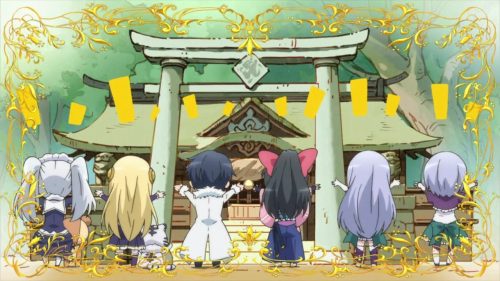
Similar to other Isekai anime with mouthful titles, Another World With My Smartphone is also largely set in middle age western-style towns and countries. However, one of the members of the hero’s party is dressed and talks like people who come from middle age Japan. As it happens, she comes from a country in the far east called Eashen. Thankfully, we get to visit Eashen in episodes 8 and 9 of the series. When we see Eashen for the first time, it feels like we have been transported from an isekai anime into a period anime. As a matter of fact, the similarities actually run a lot deeper than you might think. For starters, the name of the city that we visit is Oedo, and the leader of the nation is called Tokugawa Ieyasu, and he is currently fighting against Takeda Shingen. Those are the names of real-life Japanese leaders during the Edo period. Not only that, but the little details are also identical, such as people walking around wearing kimonos, using wooden sandals (Geta), riding inside wooden palanquins (Kagoya), and many others. It’s not even a fictional city at this point. The author simply transports a real middle-aged Japanese city into their story.
3.Mikakage from Tate no Yuusha no Nariagari Season 2 (Rising of the Shield Hero season 2)
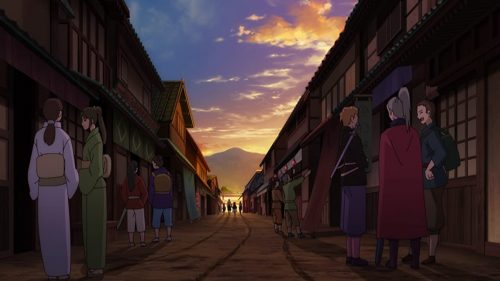
Mikakage is one of the major cities in the alternate world to the one where Naofumi was summoned to. This world is often referred to by the fandom as the Glass’s World, as opposed to the Raphtalia’s World where most of the main story takes place. Unlike Raphtalia’s world where everything tends to look relatively the same way wherever you go, Glass’s World consists of nations with different cultures. One of them is the aforementioned Mikakage. The overall architecture of Mikakage city is identical to Japan during the Edo Period. Not only that, the language, the clothing, the foods, and even the military garb are also incredibly similar to middle age Japan. What makes Mikakage different, however, is the fact that there are all kinds of races living together in harmony. Apart from humans, there are also spirit people, Grass people who look just like elves, and also Jewel people, all living their life like the people from middle-aged Japan.
2. Rimuru City from Tensei Shitara Slime Datta Ken (That Time I Got Reincarnated as a Slime)
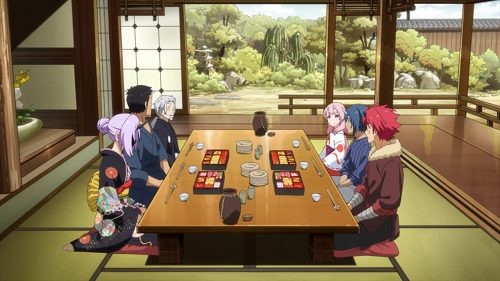
Rimuru is the capital city of the Jura Tempest Federation, a nation under the leadership of the demon lord Rimuru Tempest. Despite being the youngest city in the world, Rimuru is on the way to becoming the most advanced city of them all. At a first glance, Rimuru looks like any other western-style city, with its stone houses, churches, and several multi-story buildings. However, upon closer look, you’ll quickly realize it is actually akin to a Japanese city. That being said, unlike the other cities/countries on this list, it is not middle-aged Japan, because what Rimuru tries to replicate is actually the modern-day Japanese city. That is why you’ll see roads and buildings that are built following modern Japanese standards, restaurants, and hotels similar to those that you can find in big cities like Kyoto or Okinawa, bakeries that produce traditional Japanese confectionery and western cakes, and there are even stores that sell Japanese clothes all over town.
1. Wano Country from One Piece
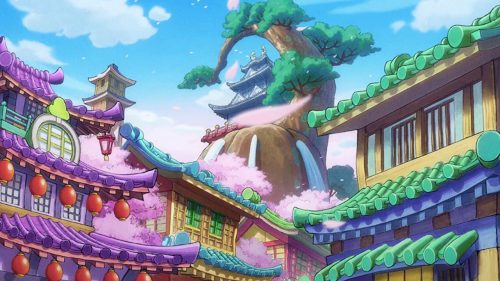
And now we finally come to the most famous fictional Japanese nation that ever graced the world of anime, which is the enigmatic Wano Country from One Piece. However, Wano is actually a bit more special than the previous towns and countries mentioned in this list. Because other than the usual surface-level similarities, Wano also has a deep and rich history of its own, complete with its own myth, legends, and heroes. Let’s elaborate for a little bit. Wano is pretty much Japan during the Edo Period. You can find traditional Japanese shops, temples, and houses here. You can see people walking around in traditional Japanese clothing, with the nobles adorned in clothes that are noticeably fancier than average people. You can also find traditional dishes like dango and ramen quite easily here. Going even deeper than that, the name “Wa” is actually what real-life Japan was called thousands of years ago before they officially changed it into Nihon (Japan). Furthermore, Wano also closed its border to shut itself from any foreign influence, just like Japan during the 16th~18th Century. So as you can see, Wano Country has taken a lot of inspiration from real-life Japan, not only in terms of cultural influence, but also social, economic, and political as well.
Final Thoughts
There are several other towns/countries that have some Japanese elements to them that deserve to be our honorable mentions. They are the Eastern Federation from No Game No Life, and the Demiplane village from Tsukimichi: Moonlit Fantasy. There’s also a nation like Wano Country that is actually perfect for this list but unfortunately has to be excluded because it simply hasn't been animated yet when this article is written, which is the Hino Country from Black Clover. Do you know any other fictional towns/countries that represent Japanese culture in anime? Let us know in the comment section below.


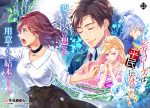
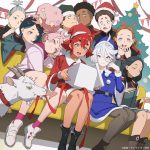










No comments